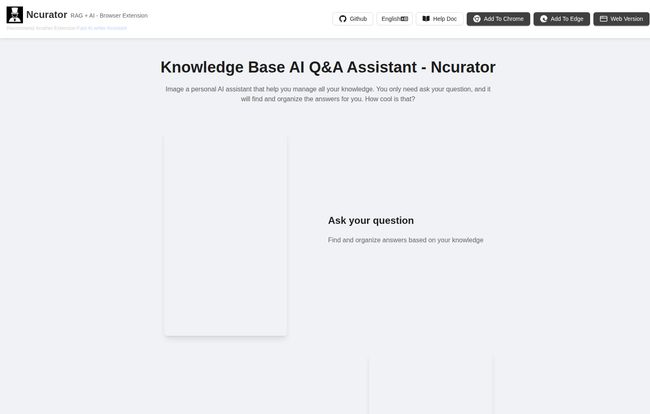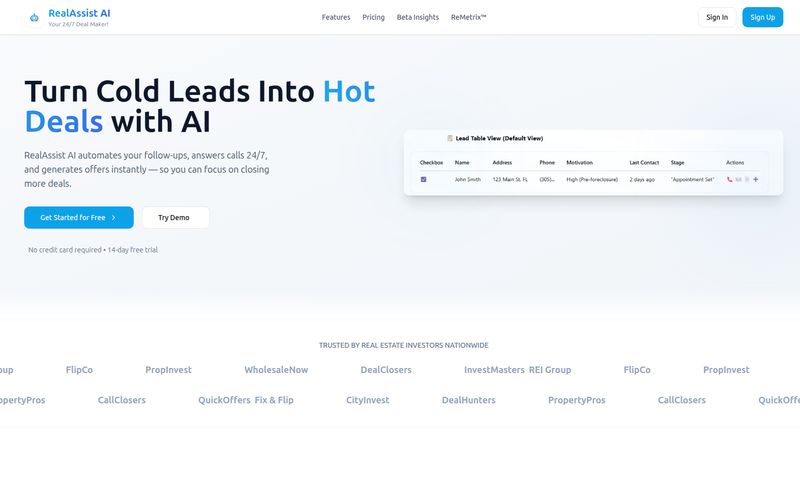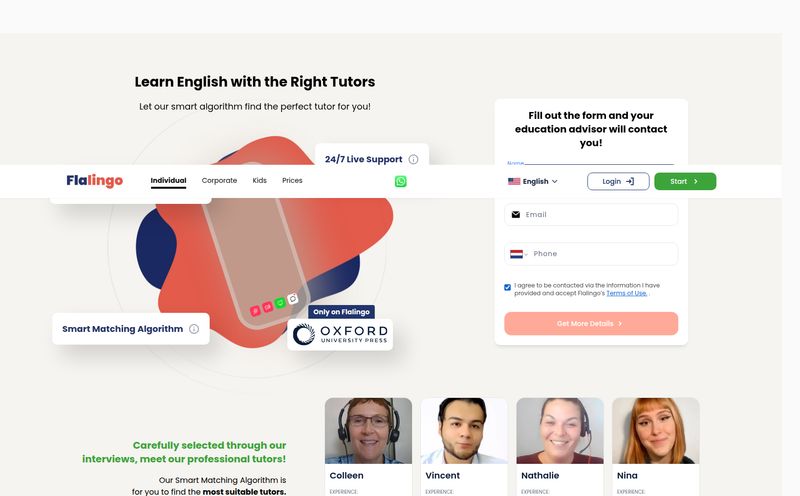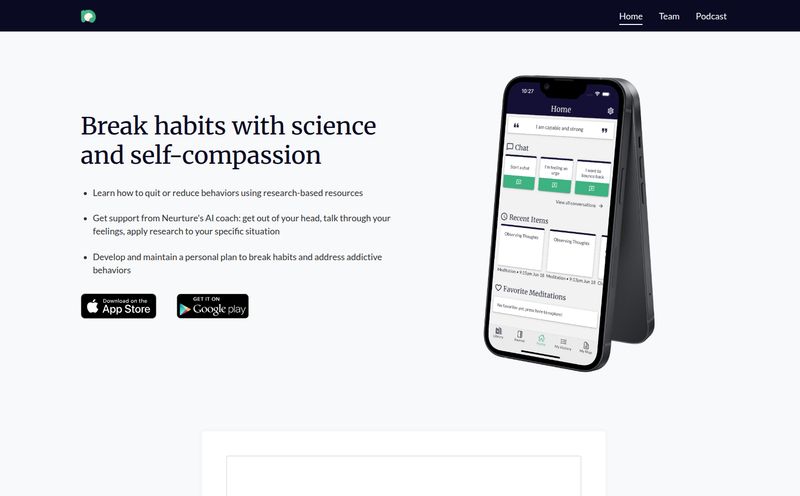If you’re anything like me, your digital life is a sprawling, chaotic mess. It’s a carefully curated disaster of bookmarked articles, half-read PDFs, project notes, and random thoughts saved in a dozen different places. We're all digital hoarders now. And finding that one specific thing you read three months ago about Q4 CPC trends? Good luck. It’s like searching for a specific piece of hay in a giant, flaming haystack.
For years, the solution has been... more organization. More folders, more tags, more complex systems like Zettelkasten that, if we’re being honest, sometimes feel like more work than they're worth. Then AI came along, promising to be our savior. But that came with its own set of heebie-jeebies. Am I really going to upload my confidential client notes to a third-party server just so an AI can summarize them? I don’t think so.
And then a tool like Ncurator pops up on my radar. It calls itself a "Knowledge Base AI Q&A Assistant." And while that sounds a bit jargon-y, the core idea made me sit up and pay attention. What if you could have a chat with all your documents, right on your own computer, with nothing ever leaving your hard drive? Now that sounds interesting.
So What Is Ncurator, Really?
Forget thinking of it as another note-taking app. It’s not. Think of Ncurator as an intelligence layer you place on top of your existing digital junk drawer. You feed it your stuff—the PDFs, the Word docs, the articles you've saved, even your browser bookmarks—and it ingests it all. It reads everything, digests it, and builds a private little universe of your knowledge.
The magic happens next. You can start asking it questions. Not just keyword searches, but actual, conversational questions. It’s like having a personal research assistant who has a photographic memory of everything you’ve ever saved. A search engine for your own brain. It finds the answer by looking only at the information you've given it, providing organized answers based on your personal knowledge base.

Visit Ncurator
The Big Deal: Why Local-First AI Is a Game Changer
Okay, let's get to the most important part. The reason Ncurator stands out from the thundering herd of AI tools is its privacy model. It’s local-first. That means all your data—every single document, every bookmark—stays on your device. It’s never uploaded to a cloud, never used to train some gigantic, corporate AI model, and never seen by anyone but you.
In an era where “if it’s free, you’re the product” has become a tired cliché, this is a breath of fresh air. I’ve talked to so many colleagues who are hesitant to use powerful AI tools for their work because of data privacy concerns. And they’re right to be cautious! Ncurator sidesteps that entire debate by keeping your digital life, well, yours. This isn't just a feature; in my opinion, it's the entire point.
Getting Your Knowledge Into the System
The whole process seems refreshingly simple, which I appreciate. There are two main steps.
Step 1: Feed the Beast (Your Knowledge, That Is)
First, you have to build your knowledge base. Ncurator gives you a few ways to do this, which is great because my information is scattered everywhere. You can directly import files like PDFs and Docx documents—perfect for all those research papers and project reports. You can also point it at webpages to crawl, or even import your entire browser bookmark collection. I'm imagining pointing it at my Pocket account export... the possibilities are a little bit thrilling and a little bit terrifying.
Step 2: Ask Away and Let the AI Do the Walking
Once your knowledge is in the system, you just start asking questions. This is where the power of semantic search comes in. This isn't your dad's Ctrl+F search. It doesn’t just look for exact keyword matches. It understands the meaning and context behind your query.
So, you could ask, "What were the main arguments against that marketing strategy I was reading about last week?" and it could piece together information from three different articles and a doc file to give you a synthesized answer. That’s the dream, right?
The Good, The Bad, and The Geeky
No tool is perfect, of course. I’ve been doing this long enough to know that there's always a catch. After poking around, here’s my honest take on Ncurator.
What I'm Genuinely Excited About
The upsides are pretty compelling. The setup looks straightforward, and I've already raved about the local data storage—that’s the crown jewel. The ability to import different data types is also a massive plus. But one of teh hidden benefits is the potential for offline use. Once you've downloaded the model and indexed your documents, you don't need an internet connection to query your own brain. For anyone who travels or has sketchy Wi-Fi, this is huge.
A Few Things to Keep in Mind
Now for the reality check. This kind of power needs some computational muscle. The developers are up-front that it requires a decent amount of computer memory (RAM), especially if you're running a powerful local Large Language Model (LLM). This probably isn't going to run smoothly on a ten-year-old Chromebook. For the best performance, you'll also want a browser and hardware that supports WebGPU, which is becoming more common but isn't universal just yet. Finally, the quality of the answers you get will depend heavily on the LLM you choose to run. It's only as smart as the brain you install.
What's the Damage? A Look at Ncurator Pricing
Here's where things get a bit mysterious. When I went to check out the pricing, I was met with a classic "404 Not Found" page. This could mean a few things: maybe they're revamping it, maybe it's temporarily down, or maybe they haven't decided on a public pricing model yet.
Given the tool's presence on GitHub, I have a hunch it might be open-source or follow a freemium model, perhaps with paid features or support down the line. For now, my advice is to check their main website directly for the most current information. It’s a bit of a question mark, but for a tool this promising, I'm willing to be patient.
Who Is This Tool Actually For?
I can see a few groups of people getting really excited about Ncurator:
- Researchers and Students: Imagine feeding it 50 dense academic papers and being able to ask, "Summarize the consensus on string theory from these documents." Yes, please.
- Writers and Content Creators: We hoard articles and swipe files like dragons hoard gold. Being able to query that hoard for themes, quotes, or statistics would be incredible.
- The Privacy-Conscious Professional: Anyone working with sensitive client data, legal documents, or proprietary business information who wants AI assistance without the security risk.
- Personal Knowledge Management (PKM) Nerds: If you're already deep into systems like Obsidian or Roam Research, Ncurator feels like the next logical step—a way to actively converse with the knowledge you've so meticulously collected.
So, Is Ncurator Your New Digital Co-Pilot?
Look, the hype around AI is deafening right now. It's easy to become cynical. But Ncurator feels different. It's not trying to be a god-like AI that knows everything. Instead, it’s trying to be an expert on you. It’s a move away from relying on massive, centralized data centers and a step towards personal AI sovereignty.
It’s a tool for thought, built on a foundation of privacy. While it has some technical prerequisites, the promise is enormous: to finally make sense of our own digital chaos. To turn a cluttered hard drive into a responsive, intelligent partner. And that, to me, is a future worth getting excited about.
Your Ncurator Questions Answered
Is my data really 100% private with Ncurator?
Based on their model, yes. The core principle of Ncurator is that all your files and the AI analysis happen locally on your own machine. Your data is not sent to any external servers, which is its main advantage over many cloud-based AI services.
What kind of computer do I need to run it effectively?
You don't need a supercomputer, but a modern machine will fare much better. The key requirements are sufficient RAM (memory) to handle the local AI model and your documents, and ideally, a system that supports WebGPU for optimal performance. The more you want to process, the more resources it will need.
Can I use Ncurator when I'm offline?
Yes, and this is a fantastic feature. Once you've downloaded the necessary AI model and indexed your documents, you can query your knowledge base without an active internet connection. Perfect for working on a plane or in a coffee shop with spotty Wi-Fi.
How is this better than my computer's built-in search?
Standard computer search (like Spotlight on Mac or Windows Search) is based on keywords and file names. Ncurator uses semantic search, which understands context and meaning. You can ask it a complex question, and it will find relevant passages inside your documents, even if they don't contain the exact words you used.
What is a local LLM and how do I choose one?
An LLM, or Large Language Model, is the AI "brain" that processes your questions. A local LLM is one that runs entirely on your computer. Ncurator will likely support or recommend certain models. The one you choose will impact performance and the quality of the answers—some are faster but less nuanced, others are more powerful but require more computer resources.
Is Ncurator free?
As of this writing, the pricing information is not available on their website. Given its open-source nature on GitHub, it's possible there is a free version or that the project is community-supported. Your best bet is to check their official website for the latest details.
Reference and Sources
- Ncurator Official Website: https://ncurator.declom.ai/
- Ncurator on GitHub: https://github.com/ncurator/ncurator
- About the WebGPU API: Mozilla Developer Network



